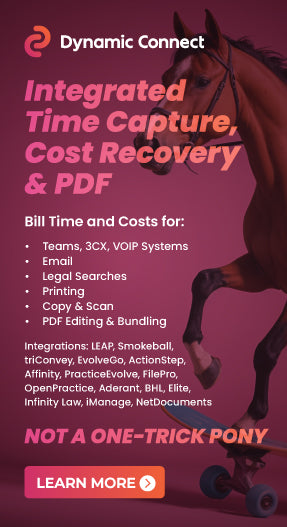
New Approaches to Growing Your Firm's Legal Services
Traditionally, the development of new practice areas involved partner recruitment and considerable investment. Modern models of practice development provide small to medium-sized law firms with the tools and resources needed to offer services in areas where they may not currently have expertise.
Exploring new areas of practice is a key profit strategy. The adage that increasing sales to existing clients is easier than attracting brand-new clients remains true. A firm’s existing client base can easily generate work that might be going to other firms or not being addressed at all, work that the enterprising law firm might be able to capture if only they could start offering the service. Examples include such disparate areas as estate planning/succession planning and franchising.
- Corporate clients instructing a firm on commercial transactions have senior executives who might require Wills and testamentary trusts. Offering that support satisfies a demand whilst reinforcing the relationship.
- Those same corporate clients might be looking to expand, increasing their geographic footprint. They may be thinking of franchising as an option. As is often the case, a successful pizza business or accounting practice might have been approached by people asking whether they offer franchises. That work could easily be lost to another firm if the service is not provided.
This article explores modern models of practice development, putting firms in a position to capture these opportunities, highlighting the place of templates supported by guidance notes, and the emerging subscription-based support models.
Traditional Model: Hire a Partner and Supporting Staff
Historically, law firms looking to expand into new practice areas would follow a well-trodden path:
- Recruitment of Specialist Partners: Firms would hire partners with expertise in the desired practice area.
- Team Building: The new partner would then build a team of associates and support staff.
- Marketing Strategy: A dedicated marketing plan would be rolled out to attract clients to the new practice area.
While effective, this approach is resource-intensive and may not be feasible for smaller firms with limited budgets and certainly beyond the sole practitioner if they wish to remain a sole practitioner.
Basic Model: Provision of Updated Templates and Guidance Notes
A more accessible model for small to medium-sized law firms involves the provision of updated templates and guidance notes. This model equips firms with the necessary documents and protocols to offer services in new practice areas without needing specialist in-house expertise. Key components include:
- Updated Templates: Standardised documents tailored to specific legal services.
- Guidance Notes: Detailed instructions on how to use the templates effectively.
- Protocols and Checklists: Step-by-step procedures to ensure compliance and quality control.
An example of this basic model is Thomson Reuters’ Practical Law, which provides a comprehensive suite of resources for various legal practices.
This model can certainly work. Todd Bloomquist, Associate General Counsel at Beam Inc, confirms that in a testimonial for Practical Law, where he says:
"I appreciate Practical Law's capabilities even more after moving from a law firm to an in-house position. Like many in-house attorneys, I must get up to speed quickly in many diverse practice areas. Practical Law has the tools to make that possible while at the same time providing enough content for a deeper dive when appropriate."
Even though it is used here in an in-house context, the point remains for private practice. The issue with this model is that it necessarily involves the lawyer trawling through extensive notes and guides, no matter how practical the notes are. This may become easier with familiarity.
Advanced Model: Intellectual Property and Subscription-Based Support
Building on the basic model, some leading lawyers have transitioned from practising law to supplying their intellectual property to other firms. This approach often includes live support delivered through a subscription model. A notable example is Tara Lucke's The Art of Estate Planning, which offers:
- Intellectual Property: fully maintained white-labelled estate planning templates and resources developed by an acknowledged expert.
- Live Support: Strategy support, mentoring and community support through member-only areas. Further support comes through a regular podcast hosted by the founder, in addition to a host of free resources.
User experiences demonstrate the effectiveness of this model. One of their subscribing lawyers, Lauren, shares her experience:
I opened my sole practice 18 months ago… the Art of Estate Planning Precedents and the TT Precedents Club have made me more confident in delivering testamentary trusts to my clients, and knowing my precedents up to date has reduced a portion of my mental load. I would highly recommend looking into these precedents.
Tara adds a great point:
Modern practice development models are essential to the future of the Australian legal profession. As more lawyers seek flexible, family-friendly work environments, these services offer vital support for lawyers establishing their sole practice or boutique firm.
Traditionally, consumers have sought technical legal advice from large firms in capital cities. Still, firms of all sizes, including rural and regional practices, can now have the capability and support to deliver high-quality legal services. It's a win for both the legal profession and our clients.
Cutting-Edge Model: Document Automation and Consultancy
Protean Franchising represents a further evolution of the subscription-based model. Its combination of document automation and consultancy services delivers a new practice to the law firm, getting close to remote partner support to facilitate a smooth service provision to the firm’s existing (not to mention new) clients.
Key features of the Protean Franchising offering include:
- Document Automation: Cutting-edge technology to create customised franchise documents efficiently. The entire document suite can be produced quickly for almost any franchise structure, delivering a superlative client experience.
- Consultancy Services: Expert advice and support to guide firms through the process, being “on tap” to answer the small questions that will necessarily arise. This augments extensive (yet targeted) guidance notes through the document creation process. Depending on the subscription model, franchise litigation can be supported, even under contract through the client-firm.
This model ensures that law firms can deliver high-quality franchise services without requiring senior staff or experienced practitioners in-house.
Benefits for Small to Medium-Sized Law Firms
Modern models of practice development offer several advantages for small to medium-sized law firms:
- Cost-Effectiveness: Reduced need for specialist recruitment and team building. Support is delivered as needed. With that efficiency comes massive cost savings.
- Scalability: Ability to expand service offerings without significant upfront investment.
- Flexibility: Access to expert resources and support on a subscription basis.
- Efficiency: Streamlined processes through document automation and standardised templates.
A Shift in Practice Development
The legal industry is witnessing a shift towards more innovative and accessible practice development models as part of a strategy to maximise revenue from existing clients. By leveraging updated templates, guidance notes, intellectual property, and subscription-based support services, small to medium-sized law firms can expand their service offerings efficiently and cost-effectively. These modern models enhance the firm's capabilities and ensure it remains competitive in an ever-evolving market.
As the examples of Thomson Reuters’ Practical Law, Tara Lucke's The Art of Estate Planning, and Protean Franchising demonstrate, the future of legal practice development lies in harnessing technology and expert resources to deliver comprehensive legal services without the traditional overheads.
By Martin Algie
Founder of Protean Franchising

Martin Algie is a leading contract negotiator, franchise lawyer, and litigator with over 30 years of experience. After working with some of the leading national law firms, Martin established his practice – MIA Contract Lawyers – in 2010, a practice that boasts decade long relationships with several clients. The client experience is central to Martin’s ethos, something that led to him being awarded the 2019 Client Choice Award in London for Australia project work. Most recently, Martin has pivoted to make his intellectual property available to the profession, establishing Protean Franchising in 2024. Through Protean Franchising, small to medium-sized law firms can start establishing and running franchises for their commercial clients.






